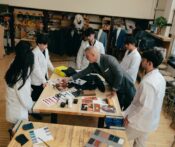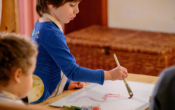 Enliven Your Teaching!
Enliven Your Teaching! Everything a Teacher Needs
Everything a Teacher Needs Jamie York Books, Resources, Workshops
Jamie York Books, Resources, Workshops Flexible preparation for your new grade
Flexible preparation for your new grade Grade Level Training in Southern California
Grade Level Training in Southern California Waldorf-inspired Homeschool Curriculum
Waldorf-inspired Homeschool Curriculum The Journey is Everything
The Journey is Everything Association for a Healing Education
Association for a Healing Education Immersive Academics and Arts
Immersive Academics and Arts Full-Time Teacher Education
Full-Time Teacher Education Waldorf EC Training & Intensives in Canada
Waldorf EC Training & Intensives in Canada Storytelling Skills for Teachers
Storytelling Skills for Teachers Caring for All Stages of Life
Caring for All Stages of Life Transforming Voices Worldwide
Transforming Voices Worldwide ~ Ensoul Your World With Color ~
~ Ensoul Your World With Color ~ Art of Teaching Summer Courses 2025
Art of Teaching Summer Courses 2025 The Art of Administration and Leadership
The Art of Administration and Leadership Discovering the Wisdom of Childhood
Discovering the Wisdom of Childhood Space speaks. Its language is movement.
Space speaks. Its language is movement. Middle School Science With Roberto Trostli
Middle School Science With Roberto Trostli Quality Education in the Heartland
Quality Education in the Heartland Bay Area Teacher Training
Bay Area Teacher Training Apply Today: New Cohort Starts Nov. 2025
Apply Today: New Cohort Starts Nov. 2025 Summer Programs - Culminating Class Trips
Summer Programs - Culminating Class Trips Bringing Love to Learning for a Lifetime
Bringing Love to Learning for a Lifetime Dancing for All Ages
Dancing for All Ages Train to Teach in Seattle
Train to Teach in Seattle Roadmap to Literacy Books & Courses
Roadmap to Literacy Books & Courses
Would you like to become a sponsor?
Waldorf News

Does the Future of Italian Tailoring Lie in ... Chicago? Naples-based luxury label Kiton thinks so, which is why it’s established a pioneering new course for Chicago Waldorf School high schoolers.
May 19, 2025
As the American director of wholesale made-to-measure, Victor de Leon, lives in the city. His children attend Chicago Waldorf School. One day, sitting in on a second-grade handwork class—Waldorf schools often eschew a traditional curriculum in favor of a holistic cocktail of intellectual, creative, and practical skills—he was struck with an idea. “I was watching seven-year-olds sewing and weaving and knitting socks and gloves and hats,” he says. “And they were doing it with such ease, like little tailors. It made me think.” More »

Trust in the Toddler
May 12, 2025
A simple pop-up puppet can be a thing of wonder for a toddler. One minute it is looking at you, the next moment it is gone! The motif of being present and hiding away has a strong connection to self, as the words from a traditional children’s song indicate: Where is Thumpkin? / Here I am! The growing sense of self in the young toddler continues to enthrall parents, teachers, and scientists as we strive to understand more about this critical period in our children’s lives. We know from brain science that the first three years of life are a time of incredible learning, and critical for a foundation for well-being and success. Alison Gopnik speaks of this time as the “R&D” of humanity – when young children are blessed with possibility and plasticity. This is a window of opportunity that has unique characteristics – the primary one being that the brain has no previous learning or knowledge. Therefore, the patterns and neuropathways that are formed can serve as a foundation for future learning. Rudolf Steiner speaks about this period as a time of opportunity and great wisdom. At this time, the young child learns not through instinct but through a higher, expanded, and “wiser” self. More »

Israel: Ein Bustan—sowing seeds for hope and peace
April 28, 2025
Ein Bustan is a Jewish-Arab non-profit organization near Kiryat Tivon that works in the field of bilingual and multicultural education based on Waldorf education. With this approach, the project was the first of its kind in Israel and still offers the only multicultural kindergarten in the north of the country. The organization was founded in 2005 by Jewish and Arab parents from neighboring communities and gives the children opportunities to get to know and interact with each other from an early age. The political situation requires great adaptability on the part of the children and their parents as well as the teachers. Gal Mosenson, who is involved in the project, told us about the current situation in January 2025: More »
Temperament Considerations When Composing Communication to Parents
March 31, 2025
Many times during the school year, school leaders must thoughtfully work through challenging decisions. Once a decision is made, the time comes to share this decision with the broader community. Ideally we have confidence in the decision and the process that was used to reach it, yet we may still worry how it will be received by our school families and friends. Consider the following thoughts on temperament as you prepare communication for your community. When we honor the diversity of the temperaments, we’ve prepared a balanced communication. We trust each temperament—each set of soul qualities— to contribute to a lively, dynamic whole school community. Paying attention to these qualities in our communication is one way of honoring and benefiting from the wide variety of ways human beings work with information. More »
The Children Are Calling…
March 24, 2025
The children want to know 3 things about you as you step into the classroom as their teacher: “Who are you, teacher?” “Can I trust you?” “What is my destiny? The first question asks if the teacher knows their own identity, their own inner being and highest star. What is the character and constitution of this teacher? The second question asks what kind of relationship will exist between student and teacher. What will flow between teacher and student? Will it be warm, consistent, trustworthy? The third question asks if the teacher understands the purpose and meaning of life, if the teacher can discern the child’s inner being, and guide the child to their own highest star. More »
 Recent Jobs
Recent Jobs
View more jobs »
 Newsletter Archive
Newsletter Archive
 Join the Mailing List!
Join the Mailing List!
Stay Connected…
Each week receive the Waldorf News Weekly Update, full of news, events, and more. Keep abreast of what's happening with Waldorf education.
 RSS Feeds
RSS Feeds